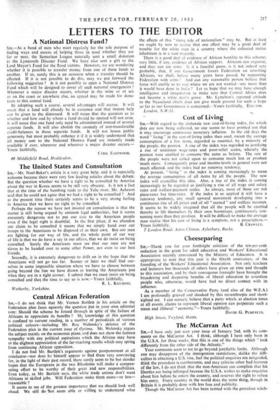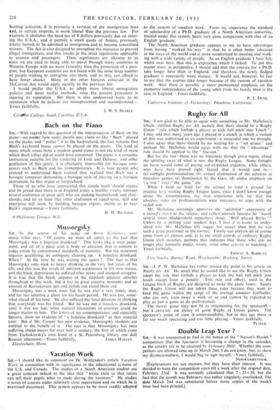The McCarran Act
have only just seen your issue of January 2nd, with its com- ments on the McCarran Act. I think, although I have only been in the U.S.A. for three weeks, that this is one of the things which "look differently from the other side of the Atlantic."
Your comments seem to me to go beyond justifiable limits. Although one may disapprove of the immigration restrictions, dislike the diffi- culties in obtaining a U.S. visa, feel the political enquiries are misguided, think the procedure is cumbersome, and may criticise other bad features of the law, I do not think that the non-American can complain that his liberties are being infringed because the U.S.A. wishes to make enquiries about him before he enters the country, and reserves the right to refuse him entry. Every country in the world does the same thing, though in Britain it is probably done with less fuss and publicity.
Though the McCarron Act has been tainted with the prevalent witch-
hunting activities, it is primarily a revision of the immigration laws and, in certain respects, is more liberal than the previous law. For example it abolishes the, head tax of 8 dollars previously due on enter- ing the U.S.A., and it permits a small quota of Asians, previously totally barred, to be admitted as immigrants:and to become naturalised citizens. The Act is also designed to strengthen the measures to prevent illegal immigration, and this results in the strict regulations applicable to seamen and passengers. These regulations are irksome to us since we are used to being able to travel through many countries in Western Europe with no more formality than the possession of a pass- port; but European countries are not faced with the same large number of people wishing to immigrate into them, and so they can afford to have fewer checks. Many of the other features criticised in the McCarran Act would apply equally to the previous law.
I would prefer the U.S.A. to adopt more liberal immigration policies and more tactful methods, since the present procedure is injuring its reputation. But there is also undeserved harm to its reputation when its policies are misrepresented and misunderstood.— Yours faithfully,
J. W. S. HEARLE.
Clem. 116n College, South Carolina, U.S.A.



































 Previous page
Previous page